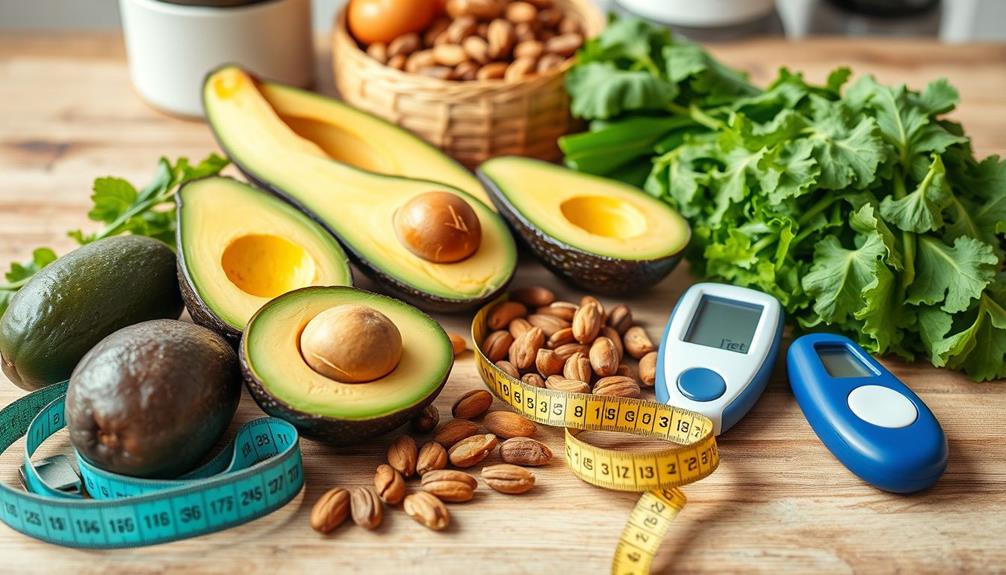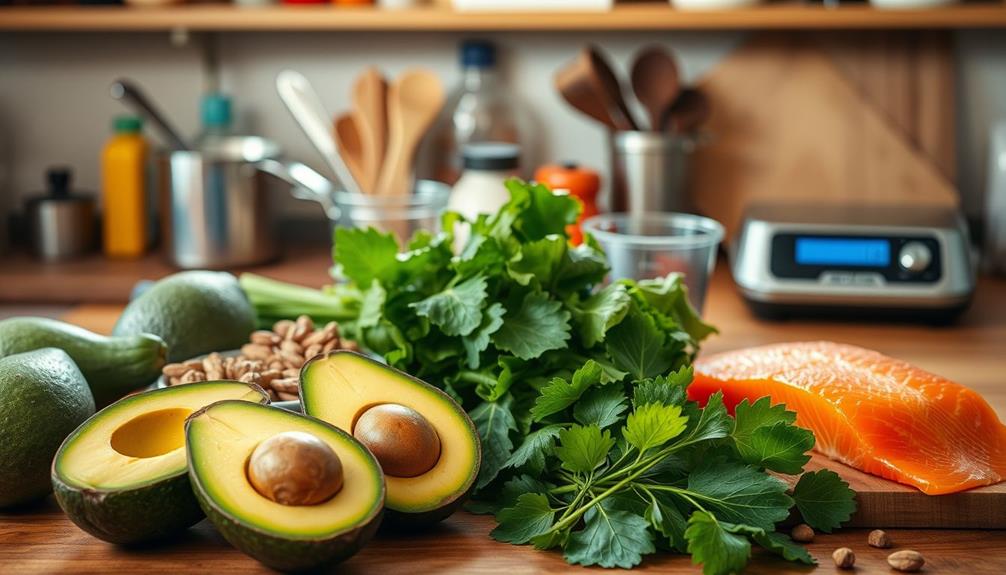Blood pressure tends to drop on a ketogenic diet mainly because your insulin levels decrease and fluid balance changes. With low carbohydrate intake, your body retains less sodium and water, leading to a reduced blood volume. This drop can be especially noticeable if you're starting with high blood pressure. You'll want to monitor your blood pressure regularly, as some people experience dizziness or fatigue. Maintaining adequate sodium and hydration is vital during this adjustment phase. Understanding the full impact on your health can empower you to navigate this diet effectively. There's much more to discover about managing your blood pressure on keto! If you’re new to the keto diet, it’s important to consult with a healthcare professional before starting, especially if you have high blood pressure. They can provide guidance on how to safely transition to a ketogenic diet while monitoring your blood pressure. Additionally, incorporating regular physical activity and stress management techniques can also support healthy blood pressure levels while on the keto diet for beginners.
Key Takeaways
- The ketogenic diet reduces insulin levels, leading to decreased sodium and water retention, which lowers blood volume and blood pressure.
- Lower carbohydrate intake initially causes rapid drops in insulin, enhancing insulin sensitivity and contributing to blood pressure reduction.
- Increased sodium needs arise on keto, and insufficient intake can exacerbate low blood pressure symptoms like dizziness and fatigue.
- Proper hydration is essential as the diet can lead to increased urination, which may further decrease blood pressure if hydration is inadequate.
- Regular blood pressure monitoring is crucial to detect drops early, especially in individuals with pre-existing hypertension or those on medications.
Understanding the Ketogenic Diet

What makes the ketogenic diet so appealing? It's a high-fat, low-carbohydrate eating plan that encourages your body to enter a metabolic state called ketosis.
In ketosis, your body shifts from burning glucose to burning fat for fuel, which can lead to significant weight loss and improved metabolic health. By consuming around 75% of your daily calories from fats and limiting carbohydrates to about 5% (roughly 20-50 grams a day), you're setting the stage for this transformation.
Incorporating sustainable weight loss strategies can further enhance the benefits of this diet. Adapting into ketosis usually takes about 72 hours, during which your body adjusts to using ketone bodies produced from fat.
One of the key aspects of the keto diet is its impact on insulin levels. When you drastically reduce carbohydrate intake, your insulin levels drop, which can help stabilize blood sugar and reduce cravings.
This shift is a fundamental reason why many people find low carbohydrate diets effective for weight management. Understanding these elements of the keto diet can help you appreciate its appeal, especially if you're looking to optimize your health and well-being while enjoying a different approach to eating.
Blood Pressure Mechanisms
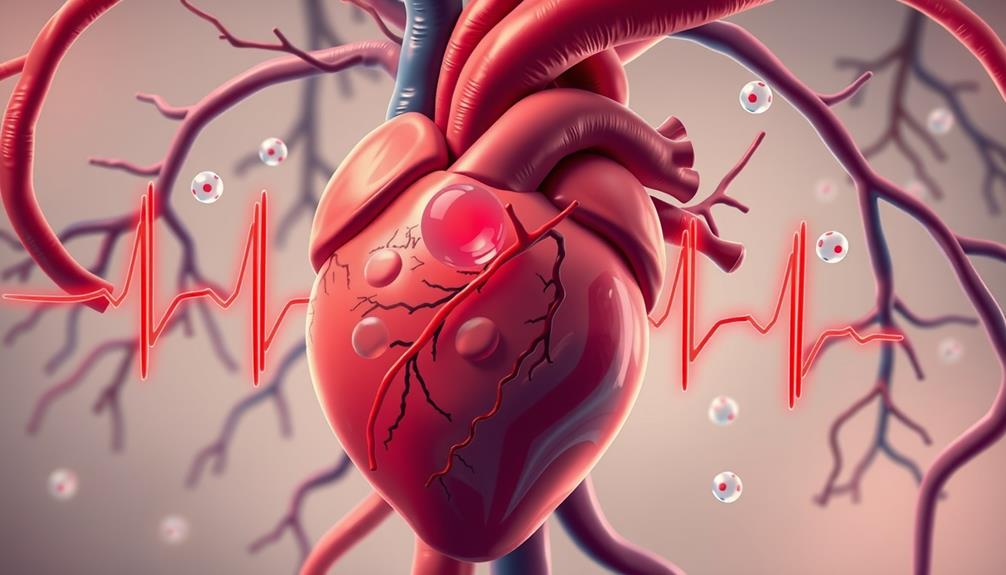
Understanding how the ketogenic diet influences blood pressure reveals several key mechanisms at play. As you shift to a keto diet, your body reduces insulin secretion, which has a significant impact on your blood pressure.
With lower insulin levels, your body decreases potassium storage and water retention, leading to a reduced blood volume. This change in blood volume can be likened to the importance of maintaining a budget for financial health, where managing resources is essential for stability.
Here are some mechanisms that contribute to this drop in blood pressure:
- Decreased insulin: Lower insulin levels lead to less sodium and water retention.
- Reduced blood volume: A decrease in blood volume directly contributes to lower blood pressure.
- Low carbohydrate intake: This affects your body's ability to retain sodium, further lowering blood pressure.
- Initial adaptation phase: You might experience dizziness or faintness as your body adjusts.
To help normalize blood pressure after this initial decrease, it's vital to focus on adequate dietary salt and hydration. Staying hydrated can mitigate some symptoms of low blood pressure, ensuring you feel your best while enjoying the benefits of the ketogenic diet.
Dietary Changes Impacting Blood Pressure

As you shift to a keto diet, you'll notice a reduction in insulin levels, which can impact your blood pressure.
This is similar to how financial considerations are essential for elderly care, as managing dietary changes requires a holistic approach to health.
You'll also need to pay attention to your sodium intake and hydration, as these factors play an important role in stabilizing blood pressure during this dietary shift.
Understanding these changes will help you manage your health effectively on the keto journey.
Insulin Level Reduction
How can reducing insulin levels through dietary changes impact your blood pressure? By following a ketogenic diet, you greatly lower your carbohydrate intake, which leads to decreased insulin secretion.
This reduction in insulin levels can also enhance the body's ability to manage fluid balance, as seen in cold medications overview, which often address similar issues like water retention. Lower insulin levels mean less potassium storage in your tissues, reducing water retention and blood volume.
As blood volume decreases, your blood pressure can drop, making the keto diet a potential ally for those with hypertension. To maintain the benefits of the keto diet, it’s important to follow an effective keto diet plan, which typically involves a high intake of healthy fats, a moderate amount of protein, and a low intake of carbohydrates. This balance can help stabilize blood sugar levels and reduce the risk of developing insulin resistance, both of which are closely linked to hypertension. Additionally, the keto diet often encourages the consumption of nutrient-dense foods like leafy greens, avocados, and nuts, which can further contribute to overall heart health and blood pressure regulation.
Consider these visual changes in your body:
- Less water retention: Your body feels lighter and less bloated.
- Decreased blood volume: Your heart works less hard, easing strain.
- Lower insulin levels: Your body becomes more efficient in using fat for energy.
- Rapid shifts: You might notice quick drops in blood pressure, especially if you'd high levels before starting the diet.
Research shows that the shift from high carbohydrates to a ketogenic diet can result in notable blood pressure reductions for individuals with pre-existing hypertension.
However, it's crucial to manage your dietary intake adequately, particularly salt, to maintain balanced blood pressure levels while on the ketogenic diet.
Increased Sodium Needs
Incorporating a ketogenic diet often leads to increased sodium needs due to the body's altered fluid balance and electrolyte levels. As you reduce carbohydrate intake, your insulin levels drop, which lowers potassium storage and decreases water retention. This shift can contribute to low blood pressure, especially since the diuretic effect of ketogenic diets increases sodium loss.
Moreover, maintaining proper electrolyte balance is vital in various fields, including AI Cybersecurity Jobs, where risk assessment and incident response are fundamental for safeguarding digital assets.
To maintain blood pressure stability, experts recommend a higher sodium intake than the general population's guidelines. You might need between 3,000 to 5,000 mg of sodium per day on a keto diet to support blood volume and prevent drops in blood pressure. If you don't consume enough sodium, you could experience symptoms related to low blood pressure, such as dizziness or fatigue.
Incorporating electrolyte-rich foods or supplements, particularly those high in sodium and potassium, can help you mitigate these risks. It's important to listen to your body and adjust your sodium intake accordingly while following a ketogenic diet. By doing this, you can better maintain your blood pressure and enjoy the benefits of your dietary changes.
Hydration's Role
Staying properly hydrated is essential when you're on a ketogenic diet, as reduced carbohydrate intake can lead to increased urination and potential dehydration.
Additionally, incorporating essential oils for dizziness relief can provide soothing effects that may help alleviate feelings of dizziness associated with dehydration.
When you don't drink enough water, your blood pressure can drop even further, leading to feelings of dizziness or faintness. To combat this, focus on balancing your hydration and electrolytes.
Here are some effective tips to maintain proper hydration:
- Drink water regularly: Keep a water bottle handy to remind yourself to sip throughout the day.
- Incorporate electrolyte-rich foods: Foods like avocados and leafy greens can help replenish lost electrolytes.
- Consider electrolyte supplements: These can provide essential sodium and potassium to support your body's needs.
- Monitor your body's signals: Pay attention to signs of dehydration, such as dry mouth or fatigue.
Role of Electrolytes
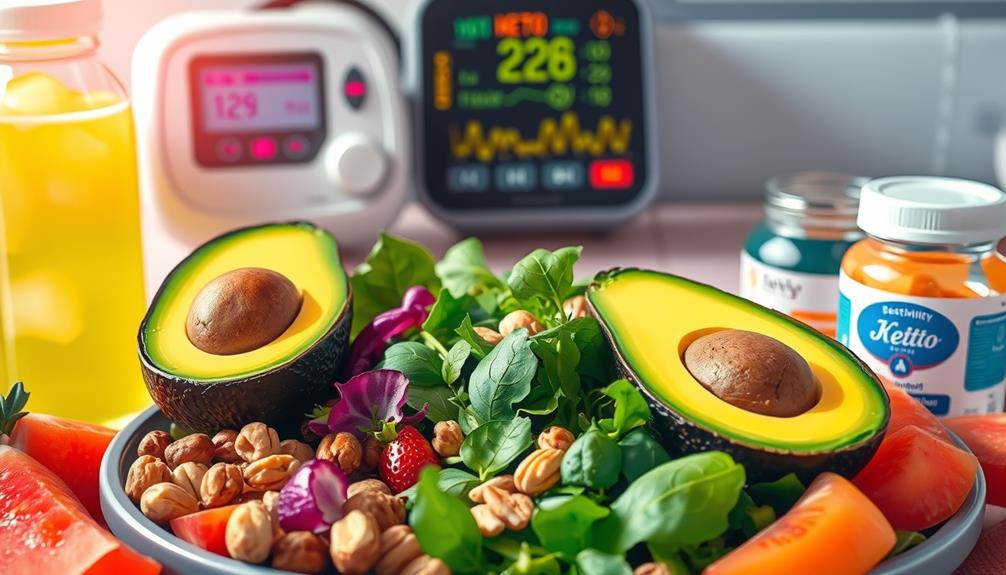
Electrolytes play an essential role in maintaining your body's balance, especially on a ketogenic diet. When you cut carbs, your insulin levels drop, leading to decreased potassium storage and a reduction in blood volume. This can result in electrolyte imbalances, particularly drops in sodium and potassium, which are important for regulating blood pressure.
Individuals with borderline personality disorder (BPD) may experience heightened emotional responses that can affect their dietary habits, making it important to monitor electrolyte levels for overall emotional and physical stability, especially during changes like starting a keto diet. emotional dysregulation can further complicate dietary adherence and health outcomes.
Adequate sodium intake is critical on a keto diet, as it helps maintain fluid balance and supports blood pressure regulation. Without enough sodium, you may experience increased fluid loss, which can further lower your blood pressure.
Hydration is key, too; when your body adapts to ketosis, decreased water retention can lead to a loss of electrolytes, making it even more important to monitor your intake.
You might also need to supplement with potassium to counteract potential deficiencies. Maintaining healthy potassium levels not only supports your overall wellbeing but also helps keep your blood pressure stable.
Symptoms of Low Blood Pressure

When you start a ketogenic diet, you might notice some symptoms of low blood pressure, even if you've never experienced them before. This can happen due to rapid changes in blood volume and insulin levels as your body adapts to the new way of eating.
As with any significant dietary change, it's important to monitor how your body responds, similar to how one would observe signs of illness in pets like hamsters routine health checks for signs of illness or injury recommended.
While many people with low blood pressure may not feel any symptoms, some common signs to watch for include:
- Dizziness, especially when standing up
- Light-headedness or fainting
- Nausea and blurred vision
- Fatigue and difficulty concentrating
These symptoms can pose a significant risk of falls, particularly for older adults.
If you're experiencing these symptoms, it's vital to pay attention, as they might indicate that your body is struggling to adjust to the ketogenic diet. You shouldn't ignore persistent or worsening symptoms of low blood pressure during your dietary changes.
Consulting a healthcare provider can offer you guidance and help guarantee your safety while enjoying the benefits of the ketogenic lifestyle.
Managing Blood Pressure on Keto
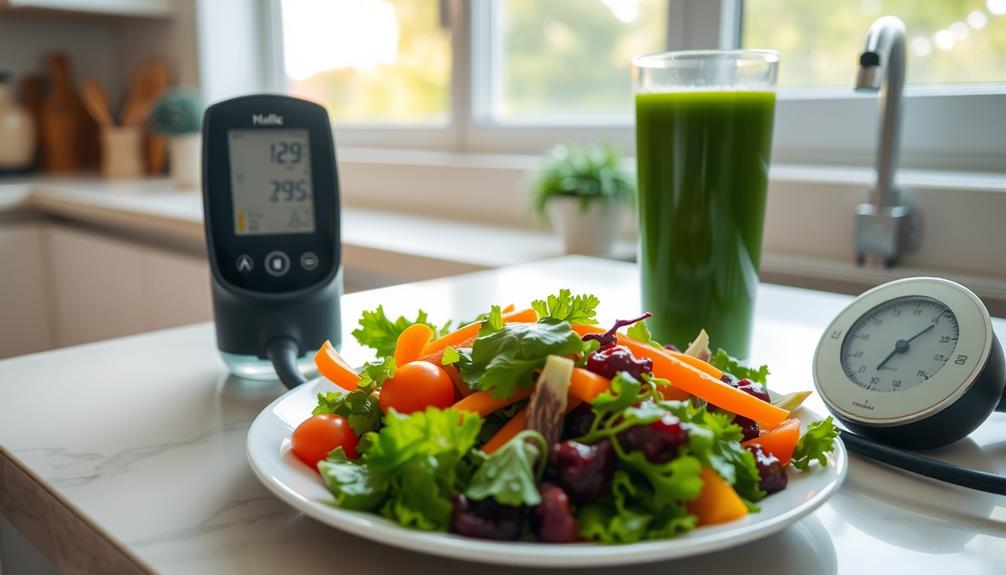
Managing blood pressure effectively on a ketogenic diet is vital for your well-being. As you shift to this low-carb lifestyle, your body experiences changes that can lead to low blood pressure. To navigate these fluctuations, consider the following strategies:
| Action | Importance |
|---|---|
| Monitor Blood Pressure | Helps you catch drops early |
| Maintain Hydration | Prevents symptoms of low blood pressure |
| Adjust Sodium Intake | Supports blood volume and balance |
It's important to confirm you're getting enough dietary salt, as low sodium levels might exacerbate low blood pressure. Staying hydrated is equally significant; dehydration can worsen the symptoms associated with low blood pressure. Some individuals may also need potassium supplementation to maintain a healthy balance.
If you're on blood pressure medications, consult with your healthcare provider during this shift. Regularly monitoring your blood pressure can help you manage any potential drops effectively, keeping symptoms like dizziness or fainting at bay. Embracing these practices can help you enjoy the benefits of a ketogenic diet while maintaining healthy blood pressure levels.
Research and Evidence
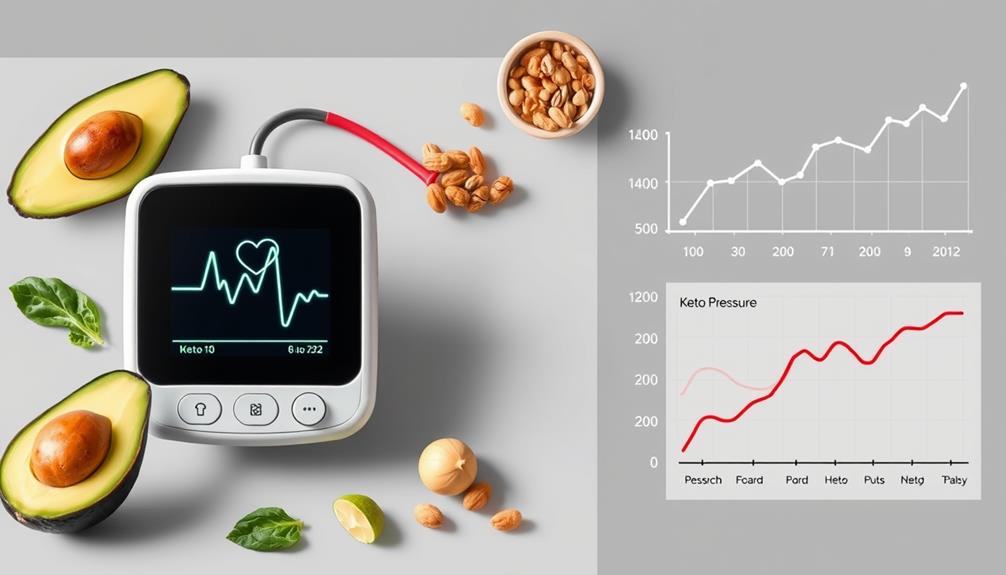
When you explore the research behind the ketogenic diet, you'll find compelling evidence about how it affects blood pressure.
Studies show that lower insulin levels can lead to mechanisms that reduce blood pressure, while other factors like dietary salt play an essential role.
Additionally, some research indicates that the energy-saving features of a ketogenic diet can contribute to overall health improvements, similar to how energy-efficient models reduce heating and cooling costs.
Understanding these connections can help you make informed choices about your health.
Mechanisms of Blood Pressure
The ketogenic diet actively influences blood pressure through several biochemical mechanisms. As you reduce carbohydrate intake, your body lowers insulin secretion, leading to decreased potassium storage and reduced water retention. This process lowers blood volume, which directly contributes to lower blood pressure.
Additionally, a well-formulated diet can support overall health, making it vital to understand the implications of dietary choices on blood pressure management, including the benefits of Cranberry Juice Consumption.
Key mechanisms include:
- Increased fat burning: Your body shifts to burning fat for energy, enhancing metabolic efficiency.
- Appetite suppression: Ketosis naturally curbs hunger, making it easier to maintain a caloric deficit.
- Lower insulin levels: Reduced carbohydrates lead to decreased sodium retention in the kidneys, further aiding in blood pressure management.
- Weight loss: The combination of fat burning and appetite suppression often results in significant weight loss, an essential factor in lowering hypertension.
Research shows that individuals on a ketogenic diet frequently experience rapid drops in blood pressure, especially if they were previously hypertensive.
This highlights the diet's potential as a non-pharmaceutical intervention for managing hypertension. By understanding these mechanisms, you can better appreciate how the ketogenic approach can positively impact your blood pressure and overall health.
Impact of Insulin Levels
Insulin plays an essential role in regulating blood pressure, and its levels greatly drop on a ketogenic diet. This reduction in insulin secretion decreases potassium storage and water retention, leading to lower blood volume. As a result, your blood pressure tends to drop considerably.
Here's a quick overview of the impact of insulin levels on blood pressure during a ketogenic diet:
| Aspect | Effect on Blood Pressure |
|---|---|
| Decreased Insulin Levels | Lowers blood volume |
| Enhanced Insulin Sensitivity | Contributes to lower blood pressure |
| Rapid Shift Effects | Causes immediate drops in blood pressure |
Research shows that individuals on a ketogenic diet experience notable reductions in both systolic and diastolic blood pressure. One study highlighted how low-carb diets, including ketogenic approaches, effectively lower blood pressure in those with hypertension. As you shift to this diet, be mindful of rapid changes in insulin levels, which can lead to symptoms like dizziness or faintness. Embracing a ketogenic diet can considerably transform your metabolic health while impacting your blood pressure positively.
Role of Dietary Salt
Dietary salt plays an essential role in maintaining healthy blood pressure levels, especially on a ketogenic diet. When you reduce carbohydrate intake, your insulin levels drop, leading to decreased sodium retention in your kidneys. This can result in increased sodium excretion, which might contribute to low blood pressure.
To counteract this effect, it's vital to guarantee you're getting enough dietary salt.
Consider these key points about dietary salt on a ketogenic diet:
- Supports electrolyte balance to prevent dizziness and fatigue.
- Helps counteract diuretic effects of reduced carbs, stabilizing blood pressure.
- Recommended intake can be as high as 3,000-5,000 mg per day.
- Promotes overall health by ensuring your body has the necessary minerals.
Adequate dietary salt intake can help you manage symptoms of low blood pressure as you shift into ketosis.
By incorporating the right amount of salt into your meals, you can maintain a healthier blood pressure level while enjoying the benefits of your ketogenic diet.
Professional Guidance and Support

Before diving into a ketogenic diet, it's essential to seek professional guidance to confirm it suits your unique health needs. Consulting with healthcare professionals can help you manage potential side effects, including low blood pressure, which some individuals may experience when starting keto.
They can provide tailored advice on maintaining a balanced diet while addressing concerns about electrolyte management and hydration. Nutritional Product Advisors are an excellent resource for understanding the health effects of dietary changes and can offer personalized recommendations on salt intake.
Engaging with these experts allows you to navigate the risks associated with low blood pressure effectively. They can help you develop strategies to make sure you're getting enough electrolytes, which is key to maintaining your well-being on a ketogenic diet.
Continuous education on how your dietary choices impact blood pressure is empowering. By keeping yourself informed and leveraging professional support, you can make informed decisions that promote overall health.
Pharmasave Summerland and similar resources are valuable for those opting for a ketogenic lifestyle, providing guidance on managing blood pressure and addressing related health concerns. Don't underestimate the importance of this support as you commence your keto journey.
Frequently Asked Questions
Does Ketosis Cause Low Blood Pressure?
Yes, ketosis can cause low blood pressure. As you reduce carbs, your insulin levels drop, leading to less sodium and fluid retention, which may lower your blood pressure. Staying hydrated and managing electrolytes helps.
Why Does Keto Lower Blood Pressure?
Did you know that people on a ketogenic diet can see blood pressure drop by as much as 10-15 mmHg? This occurs as insulin decreases, reducing fluid retention and overall blood volume in your body. For those looking to maintain or optimize their blood pressure on a ketogenic diet, there are several keto diet tips that can be helpful. It’s important to focus on consuming whole, unprocessed foods such as leafy greens, avocados, and lean meats. Additionally, staying properly hydrated and managing stress levels can also contribute to maintaining healthy blood pressure levels while on a keto diet.
Why Does Blood Pressure Drop on a Low-Carb Diet?
When you switch to a low-carb diet, your insulin levels decrease, leading to less water retention. This can lower your blood volume, causing your blood pressure to drop, especially if you're already prone to low levels.
What Do Cardiologists Say About the Keto Diet?
Imagine you're on a keto diet, and cardiologists highlight its potential to lower blood pressure. They stress monitoring your levels closely and ensuring you maintain proper hydration and salt intake for ideal health.
Conclusion
As you navigate the twists and turns of the ketogenic diet, remember that your body's response—like a delicate dance—can lead to a dip in blood pressure. Picture yourself savoring delicious, low-carb meals while staying mindful of electrolyte balance. By listening to your body and adjusting as needed, you can manage those changes with grace. Embrace the journey, seek guidance when needed, and let the vibrant energy of keto fuel your path to health.



